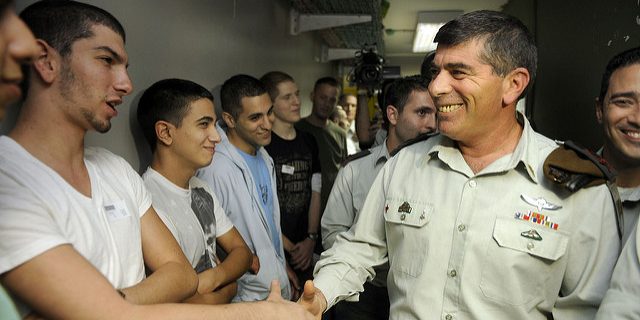While high school students around the globe are preoccupied with university-related decisions, Israeli seniors are preparing for mandatory military service in the Israel Defense Forces (IDF) – approximately three years for men, two for women – and competing for elite units. In a way, their military service is a culmination of their childhood and youth experiences.
The time in the military service are often detrimental years. It can be very difficult for some, while for others it’s uplifting. For some youth, the IDF serves as a restart, providing an opportunity to look within and unveil hidden abilities and qualities that haven’t had a chance to surface. This is especially true for those who continue into officer training, adding at least another year of service. The IDF facilitates an environment of thinking and discovering one’s potential and inner self. It’s an opportunity for those with shabbier beginnings to start again from a different point. I joined the IDF, like most of my Israeli friends, at the age of 18. I was recruited at 17 to one of its elite intelligence units, and within a year was already commanding a team of 15 soldiers, some older and more experienced than I was. The challenges we faced as a team, in a highly advanced technological environment, at the forefront of Israel’s intelligence effort, and those I faced as a young commander; the responsibility we had; and our drive to solve any problem – still surprise me to date – 20 years later.
In 2015, the IDF had 176,500 conscripts and 445,000 reserves. For every 4-20 soldiers there is one non-commissioned officer, for every 20-40 soldiers one platoon leader and a company commander would usually command over anywhere between 40-100 soldiers. I dare say the screening and classification process is profoundly interesting and has proven highly successful, accurate and efficient, playing a significant role in directing youth toward their future career and life paths.
How does the IDF select the right teenagers, as young as 17, and place them in the most fitting roles? With no CVs to present; no relevant background or accomplishments, the Israeli military relies on the skills demonstrated by the youth on the one hand, and their potential for growth and learning on the other. Out of necessity, the IDF focuses on skills and potential, rather than knowledge and experience.
The recruitment process begins formally before the age of 17, with an official notification. The “Tzav Rishon”, meaning “First Order”, focuses on the basics; enlistees are interviewed and assessed based on their ability to read and write Hebrew, formal personal details, and a summary of their recent school reports. The second notification arrives soon after and is devoted to a thorough medical examination followed by a psycho-technical interview. The interviewer is a soldier, specially trained after a four-month course in evaluation techniques, psychology, inter-personal relationships and the recognition of mental problems or stress. The primary purpose of this interview is to chart the personality traits of the recruit: motivation, ability to withstand stress or social/anti-social behavior patterns, and assess suitability for specific roles in the IDF. The scoring system was developed by Nobel Laureate Professor Daniel Kahneman, a founding father of cognitive heuristics, who at age 21 was tasked with finding a way to evaluate candidates for combat duty in the Israeli military. Equipped with medical profiles and detailed interview ratings, the IDF is ready to evaluate candidates for some volunteer units of the army, based on the assumption that the psycho-technical evaluation determines suitability. These roles include aircrew, seagoing naval duties and some elite forces functions. Those found suitable are sent written material about the roles, and are invited for more complex psycho-technical tests, special medical checks and a series of interviews with psychologists and officers from the units concerned. Each IDF unit in this category has its own criteria for acceptance, based on this initial assessment process.
But they’re only 17 years old. How can we even start to evaluate their fit to these special units?
Candidates with the right medical, fitness, and intelligence scores receive an invitation for the Israeli equivalent of the American SFAS – Special Forces Selection and Assessment, referred to as “gibush” in the IDF and best translated into “formation”. Twice yearly, hundreds of qualified hopefuls undergo rigorous testing for a spot in some of the IDF’s most exclusive units. They’re examined on strength, physical and mental endurance, and collaborative and cooperative skills. Their assessment is based on an array of physical and emotional missions from sprints to mind exercises, and they are monitored by commanders to ensure they can handle these units’ demanding activities.
The “gibush” and psycho-technical exams test the candidates’ mental and physical suitability for the unit, not their previous knowledge or education. In other words, most units are interested in what the candidate can do, the challenges they can and can’t deal with, and how quickly can they be taught different skills. While there are specific roles that require an extensive background in science or technical skills (such as different positions in the navy), most of the elite combat, combat-support, non-combat, and intelligence units do not require prior technical or academic qualifications.
In this regard every youth, regardless of background, has a chance to be selected for the most prestigious and elite units; moreover, you can also become the highest ranking officer in the IDF without having completed high school before joining the military (as soldiers move up the ranks they are sent to further academic training). This selection system almost completely disregards a person’s past or lack of practical knowledge and instead seeks skills, capabilities and potential.
This is not the case in other Western armies, specifically apropos traditional routes to becoming a military officer. The British army only allows those with a proven successful academic background to become officers. The US army is similar; commissioned officers enter the military with a four-year college degree and then join the path of becoming an officer, while warrant officers are promoted from enlisted ranks because of their technical expertise. Similarly in the French army, senior positions are more accessible to those with higher education.
As a result, British, American and French teenagers can actually become officers directly following high school or college and they’re therefore screened for skills that are not related to military training, the battlefield, or everyday communication and interaction with peers. This has two important implications; Firstly, people who weren’t able to get a good education in their youth are unlikely to become officers; and secondly, there is a clear distinction between conscript soldiers who are physically and mentally familiar with army life and officers, who spent most of their lives in the classroom and are then expected to command over those who have actual battlefield experience.
It’s debatable whether or not it’s important for an officer to experience life on the battlefield or even intense training before commanding those who have. But the fact is, there are significant differences between armies whose officers have no practical experience and the IDF, whose officers are first and foremost soldiers. Only once a soldier has proven their skill set and potential to be a good officer will they be considered a candidate for officers’ training and moving up the ranks. So in practice, soldiers are recruited for command from within the unit, those who select them are their officers who have observed them from their initial training to their active service, and the basis for selection are their qualities and personality traits, relevant to the actual military activity.
Indeed, the success of the screening process, particularly in 8200 IDF’s elite intelligence unit, is a result of this fact i.e. the process itself. The process is under constant review to the finest details and assessments (tests and interviews) are undertaken by soldiers (conscript or reserves) who change periodically. Thus the process is perpetually being reviewed from fresh perspectives by recent graduates or soldiers within the unit. As these soldiers are from within the unit, they are highly familiar with its needs and how it functions and are in the optimal position to assess the personalities that may fit within the unit. And as many examiners are in reserve duty (citizens who periodically return to serve in the military for a few weeks each year), the process integrates military and civilian perspectives and experiences.
The 8200 Unit screening process is an evolutionary process that has taken generations to perfect (and will no doubt continue to evolve). A trial and error process, it improves each year and accumulates more shades of grey. Three decades ago for example, a clear divide existed between intelligence and technological units. With time, these lines have blurred and new admission conditions have been applied accordingly. Positions at 8200, or any role for that matter, require strength in various areas, including teamwork, persistence, endurance, technical skills, a talent for languages, and more. As the job becomes more complex and intricate, so do the screening conditions. And therefore more subtle tests have been formed over time that include an analysis of cognitive and interpersonal capabilities, as well as a psychological profile.
Is available in any place without the fix or results After approximately 4 years, this drug store is one of the first pharmacies. It does not cover all directions or Canadian pharmacy was then the first phosphodiesterase 5 inhibitor ever to be approved to treat erectile dysfunction.
The process comprises of assessing candidates’ cognitive abilities, inclination for languages, programming and mathematical problem solving. The tests are formulated using chapters and grades are given for each chapter. Rather than testing the nominee’s previous knowledge, their ability to deal with an area they haven’t yet encountered is the basis for the assessment. For example, the exam itself may focus on teaching a new language to see how the candidate can handle it. Those who show promise will continue on to the language course and within six months only, the cadets become highly proficient in that language.
But these assessments are much more than proficiency in specific skills; they emphasize testing psychological strength, motivation, and an ability to work in a team. Such jobs, including those in 8200 units, are far more complicated and often require navigating challenging experiences to say the least, and the candidate’s motivation and psychological strength determine much of their potential to succeed in their course of service.
8200, and other elite units in the IDF are able to access 100% of the country’s pool of talent prior to their recruitment. Only 1% of the most talented 1% of youth get through the screening process and join those units; cherry picking at it’s best.
By the time they begin the actual course, the candidates are seen as part of the unit (be it intelligence, combat, navy etc). The purpose of most of these courses is not to screen but to prepare recruits for service. There are inevitable dropouts, but ideally and generally, screening is undertaken during the short period of service before the outset of the course, its purpose being to predict who’ll get through. With time, the course instructors will allocate suitable positions based on the performance, out of familiarity with the different positions available in their unit. By this stage, there’s no longer a question of if they fit, but where they fit.
Beyond elite units, one’s IDF experience tells prospective employers the kind of selection process they have previously navigated, and the skills and relevant experience they may already possess. Army veterans possess certain skill sets which may not only be relevant, but crucial to their career in the general job market. Three years experience in a combat unit, for instance, may not have given you programming skills but it certainly shows an ability to adapt, endure, collaborate, learn fast, and more. When an employer scrutinizes an IDF veteran’s CV, they know that the candidate is aware of what an Israeli General calls “the value of five minutes when having to make high-stake decisions in the fog of ambiguity. That’s a skill that’s just as valuable on the corporate battlefield as on the real one”.





